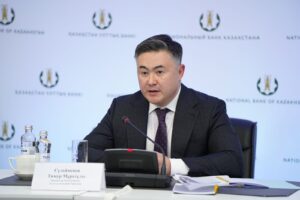ASTANA – The Monetary Policy Committee of the National Bank of Kazakhstan (NBK) has decided to keep the base rate at 15.25%, NBK Governor Timur Suleimenov announced at a Jan. 17 press briefing.

National Bank Chairman Timur Suleimenov at a Jan. 17 press briefing. Photo credit: National Bank of Kazakhstan
As of December, inflation in Kazakhstan rose to 8.6%, aligning with the forecasted range of 8-9% for 2024. The increase was driven by rising service prices and the acceleration of non-food product inflation since August.
“External price pressures stem from rising inflation in Russia, Kazakhstan’s key trading partner. Additionally, inflation in leading global economies has been gaining momentum in recent months, laying the groundwork for a prolonged period of elevated global interest rates. These expectations are already reflected in the strengthening of the U.S. dollar, which exerts pressure on the currencies of emerging markets, including the tenge,” said Suleimenov.
Inflationary pressures within the economy are driven by strong consumer demand fueled by ongoing fiscal stimulus, rising utility prices, and the weakening of the tenge.
The weakening of the tenge has led to a rise in inflation expectations among the population, which reached 14.6% in December. Survey respondents noted higher prices for food, medicine, household chemicals, communication services, and utilities.
Kazakhstan’s short-term economic indicator growth accelerated to 6.2% year-on-year by the end of 2024, which may indicate signs of economic overheating. Growth was observed in all major industries. Agriculture, construction, trade, and transport demonstrated the most significant increases. The manufacturing industry also experienced accelerated growth.
According to Suleimenov, Brent crude oil prices surpassed $80 per barrel in early January, marking a four-month high. This rise is attributed to new U.S. sanctions against Russia, concerns over supply disruptions, reduced U.S. oil inventories, and potential tightening of sanctions on Iran. These factors, along with OPEC+ production cuts and geopolitical tensions, are expected to sustain high oil prices in the near future.
Suleimenov also said over the past year, NBK has been discussing transitioning to monetary neutrality in gold purchases. He explained that the NBK uses its priority right to buy gold from local mining companies, aiming to boost international reserves and protect the economy from external shocks. This approach has been effective, increasing reserves to $45.8 billion, with $23.8 billion in gold.
However, such operations contribute to inflation, as they are funded by the issuance of tenge.
“We are starting dollar sales as part of mirroring operations related to gold purchases,” Suleimenov said. “I would like to emphasize that these operations are not currency interventions. Their main objective is to reduce the excess amount of money in the economy and achieve the 5% inflation target. At the same time, these measures will create an additional currency supply in the domestic market, contributing to balancing the domestic currency market.”
With these factors in mind, Suleimenov stressed that the National Bank would “thoroughly assess” the need for additional monetary tightening measures.
“We want to emphasize that, if necessary, we are prepared to promptly adopt stricter decisions to stabilize inflation expectations and guide inflation back onto a sustainable downward path, aiming for the target rate of 5%,” he said.
